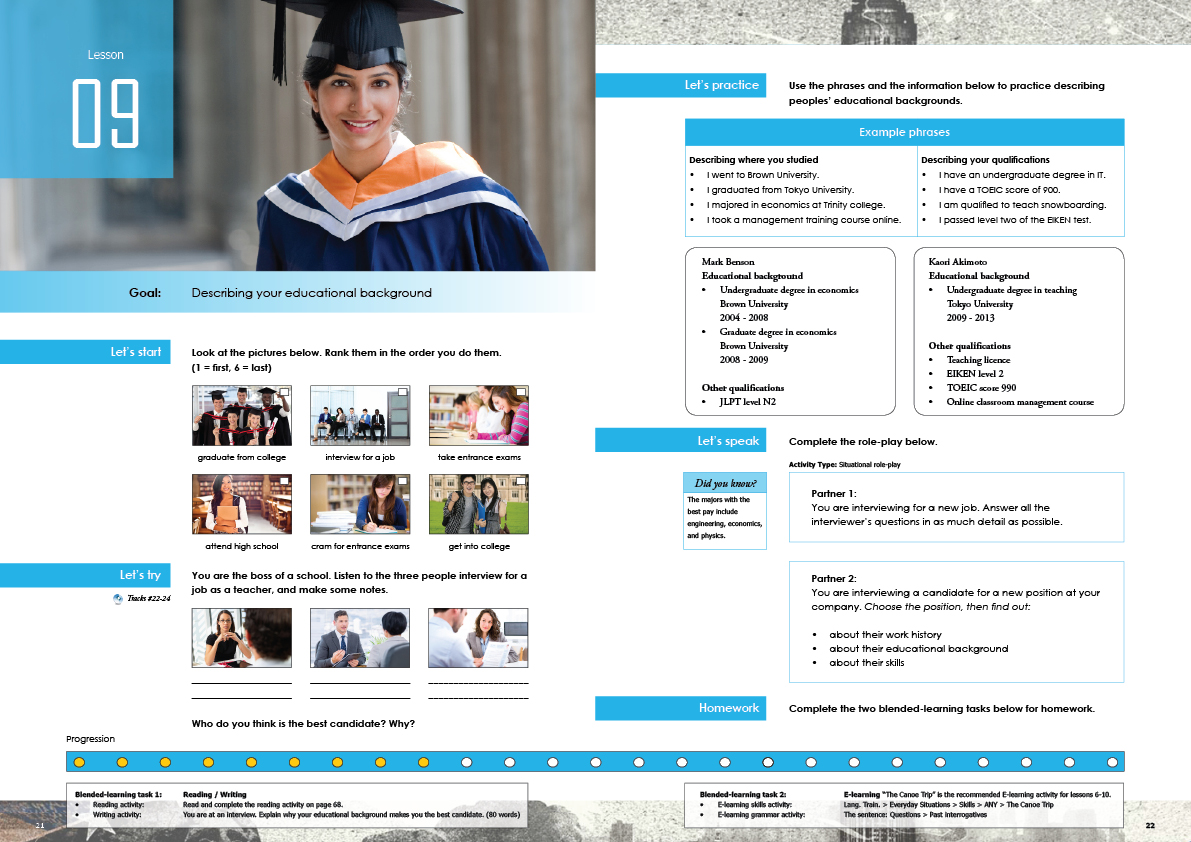
Manuals > General English > Rosetta Stone Advantage > Elementary - Book 2 > Lesson 9
< Previous Lesson | Next Lesson >

By the end of the lesson, the student should be able to describe their educational background.
Communication strategies:
The student should be able to describe their educational background using the following strategy:
1) state where they went to school.
2) state what they studied.
3) state their skills.
e.g.
I went to Brown University. I did an undergraduate degree in economics. Also, I passed the N2 level of the JLPT. I can speak three languages and I’m good at managing large projects.
Words and rules:
- The student should be able to name some school or university subjects. e.g. history
- The student should be able to name some different qualifications. e.g. MBA
- The student should be able to talk about events in the past. e.g. I graduated from university in 2014
Appropriateness:
Non-verbal behaviour: At the start of an interview, you usually don't take a seat until the interview gestures you to do so. You can teach the student this gesture. (the role-play in the lesson is an interview)
Register: We usually use a formal register during a job interview
Social rules: You will normally offer someone a drink at the start of an interview. You can accept or decline it. Also, It is beneficial to show confident body posture during an interview.
Cultural references: NA
Track #22
I studied at that university for 4 years. I did English Language as my
undergraduate degree. I enjoyed it very much.
Track #23
I have a master’s degree in education, and ten years’ experience teaching high school students. It’s true that English isn’t my native language, but I passed level 1 of the EIKEN Test. Plus, I have a TOEIC score of 990.
Track #24
I took a course in teaching for 1 week. I graduated high school in 2001. I passed all my high school exams.
Because the lesson touches on the topic of subjects, you are welcome to introduce some of the following vocabulary if you like.
1) architecture (n)
2) chemistry (n)
3) economics (n)
4) law (n)
5) marketing (n)
6) medicine (n)
7) nursing (n)
8) psychology (N)
9) dentistry (n)
10) archaeology (n)
Option 1:
Difficulty ★★
Type:
Let's practice - Game - Controlled practice
Purpose:
To allow the student to practice describing and guessing different subjects
Method:
Play a game in which one partner describes a subject, and the other partner has to guess what the subject is. The person describing the subject isn’t allowed to say the name of the subject.
A) I learned all about the pyramids of Egypt and who built them.
B) Did you study ancient history?
“Naruhodo” Point
The Australian and New Zealand academic degrees are:
- diplomas (1–2 years),
- advanced diplomas (1–2 years),
- bachelor's degrees (3 years),
- bachelor's degrees with honours (bachelor's + 1 year),
- master's degrees (bachelor's + 1.5–2 years),
- postgraduate diplomas (1–2 years),
- graduate diplomas (1–2 years) and
- doctorates (bachelor's with Honours or master's + 3–4 years).
Extra questions you might like to ask in the lesson
- Where did you go to school?
- What was your major?
- Why did you choose that?
- What are your skills?
A speaking hint you might like to use
AAA = Answer Add Ask
> Feel free to use this speaking hint in the “Let’s Practice” / “Let’s Speak” sections of the lesson. This is particularly useful when describing someone’s personality.
Question: Where did you go to school?
Answer
I went to school at Yale.
Add I did a bachelor’s degree in teaching. It was challenging, but I learned a lot.
Ask How about you?
Some grammar that might come up in the lesson
Adjective + infinitive
e.g. able to / qualified to
Verb + preposition
e.g. major in /
graduate from / go to
Let’s start
1) attend high school
2) cram for entrance exams
3) take entrance exams
4) get into college
5) graduate from college
6) interview for a job
Let’s try
Track #22
She studied at that university for 4 years. She did English Language as her undergraduate degree. She enjoyed it very much.
Track #23
She has a master’s degree in education, and ten years’ experience teaching high school students. It’s true that English isn’t her native language, but she passed level 1 of the EIKEN Test. Plus, she has a TOEIC score of 990.
Track #24
She took a course in teaching for 1 week. She graduated high school in 2001. She passed all her high school exams.
Who do you think is the best candidate? Why?
I think that speaker two is the best candidate because even though she isn’t a native speaker, her English is very good and she has the best qualifications and experience.
Let’s practice
Mark Benson
Educational background
Undergraduate degree in economics
Brown University
2004 - 2008
Graduate degree in economics
Brown University
2008 - 2009
Other qualifications
JLPT level N2
Expected outcome
He went to Brown University. He has an undergraduate degree in economics. He also has a graduate degree in economics from the same university. He passed the N2 level of the JLPT.
Let’s speak
Interviewing someone for a job
A) Where did you work before?
B) I worked at Sony as a game designer.
A) What were you responsible for?
B) I was responsible for making PS4 games.
A) Can you tell me a little about your qualifications?
B) Sure. I went to school at MIT, and I have a master’s of computer science.
A) Great! And can you tell me about your skills?
B) Sure. I am able to program games. I can use C++ and Ruby, and I can speak three languages.
A) OK great. Thank you for coming in today. We will be in touch.